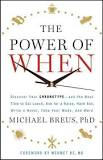The Power of “When” in Blog Marketing – Part B

After reading some of the insights about time and timing in Michael Breus’ book The Power of When, I couldn’t help thinking of the tremendously influential role timing plays when we’re marketing a business or professional practice by publishing blog posts.
The most obvious time-based question, of course, is how often we should be posting blogs. “It’s easy to be immediately overwhelmed by the thought that you have to post multiple times daily,” says Kissmetrics. Look at other small businesses in your industry, is Kissmetric’s advice. “You might find that, in your industry, one post a week will do, whereas other industries may need a couple of posts per week.”
A successful business blog doesn’t have to have a huge amount of traffic, Kissmetrics assures readers. “It just needs to attract traffic that is likely to convert.” Hints to improve conversion:
- Write posts on topics your target audience will find interesting.
- Keyword optimize the posts.
- Add a call to action at the end of each post.
“People pay you, not pageviews,” Kissmetrics reminds business owners obsessing about their blog stats.
Last, but not least, Kissmetrics adds, you will need to consider when you can successfully repurpose blog content. The sooner you repurpose it, the better your audience’s response will be, because they are already interested in the topic. The only thing to watch out for, Kissmetrics cautions, is digging too far back and repurposing out-of-date content without first updating it.
But it’s not only timing that matters, but consistency, Gerry Moran of Marketingthink.com reminds blog content writers. Whether it’s the evening news, the morning newspaper, or the Sunday football games, we all expect content we know and love to be delivered consistently. Whether it’s your e-newsletter or your blog, be consistent about scheduling.
Moran calls attention to the fact that the time component of blogging involves readers’ time, too. There is no right length for a blog post, he says, but take your readers’ time into consideration (Since a 500-word post takes about 2 minutes to read, that matches the attention span of many readers).
Just think about the tremendously influential role timing plays when we’re marketing a business or professional practice by blogging!.


 Those word “skeletons” can be use, I explained:
Those word “skeletons” can be use, I explained:
Follow us online!